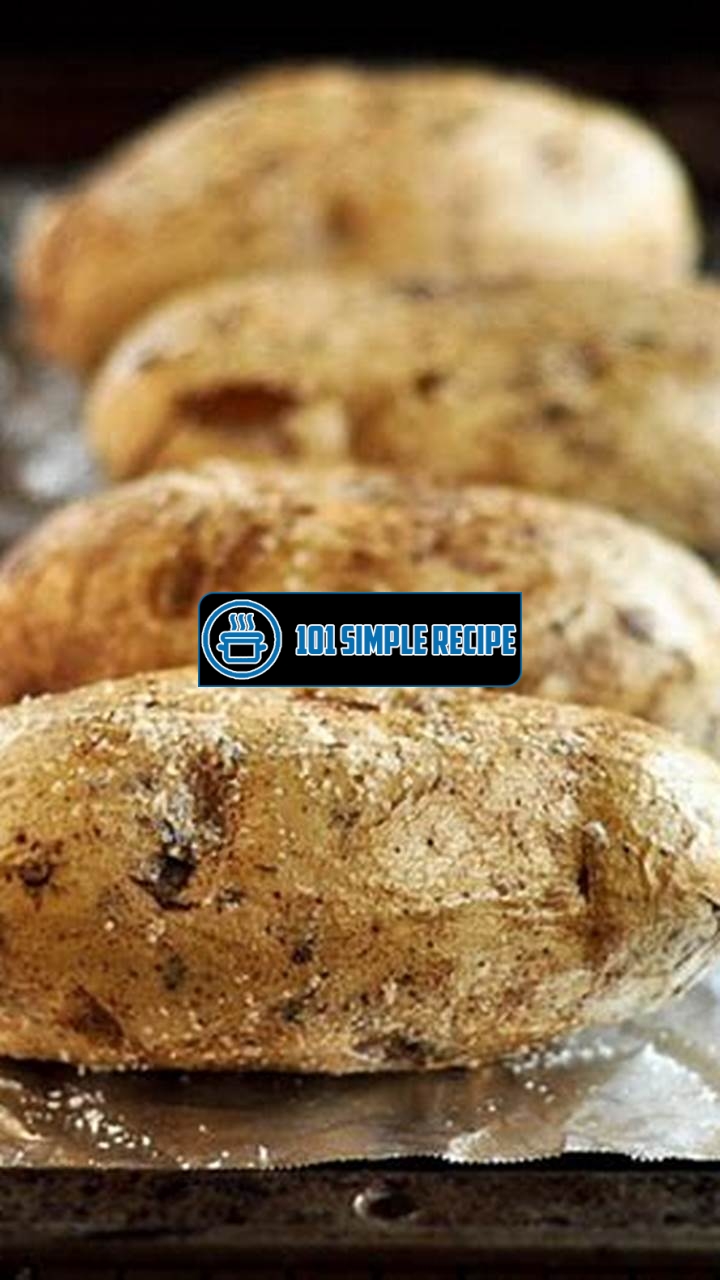Are you ready to elevate your potato game to a whole new level? Look no further because we have the ultimate guide to mastering the art of baking potatoes! Whether you’re a seasoned home cook or a beginner in the kitchen, these tips and tricks will help you achieve perfectly crispy and fluffy potatoes every time. From choosing the right potato variety to mastering the cooking technique, we’ve got you covered. So grab your apron and let’s get started on this potato adventure! ️✨

Understanding the Importance of Proper Baking Time
Discover the significance of getting the baking time right for perfectly cooked potatoes.
The Effects of Undercooking
Undercooking potatoes can have several negative effects on your dish. When potatoes are not cooked enough, they remain hard and unappetizing. The texture is unpleasant and the taste is starchy and raw. This can ruin the overall enjoyment of your meal. Additionally, undercooked potatoes can be difficult to digest and may cause discomfort or bloating. They can also detract from the presentation of the dish, as they lack the appealing softness and golden color that perfectly cooked potatoes have.
To avoid these undesirable effects, it is crucial to ensure that you bake your potatoes for the correct amount of time. This will allow them to fully cook through and reach a deliciously tender and fluffy consistency.
The Consequences of Overcooking
Overcooking potatoes is just as problematic as undercooking them. When potatoes are baked for too long, they become excessively soft and mushy. The texture becomes unappetizing, similar to the consistency of baby food. The flavors can also be negatively affected, resulting in a bland or unpleasant taste.
In addition to the negative impact on taste and texture, overcooked potatoes can lead to nutrient loss. The longer they are baked, the more vitamins and minerals they lose. This can diminish the nutritional value of your dish.
Furthermore, overcooked potatoes can pose a challenge for your digestive system. They may be harder to digest and can cause discomfort such as bloating or indigestion. Overcooking can also cause the potatoes to lose their shape and fall apart, making them difficult to work with in recipes that require intact potatoes.
Determining the Ideal Baking Time
Knowing the ideal baking time for potatoes is key to achieving perfectly cooked results. The exact baking time will depend on the size and type of potatoes you are using, as well as your desired level of doneness.
As a general guideline, medium-sized potatoes typically take around 45 minutes to bake at a temperature of 400°F (200°C). However, it is best to rely on visual cues to determine doneness. The potatoes should be easily pierced with a fork or knife and the skin should be crispy and golden brown.
If you are uncertain about the doneness of your potatoes, you can also use a food thermometer to check the internal temperature. The potatoes should reach an internal temperature of at least 210°F (98°C) for proper doneness.
Remember to adjust the baking time accordingly if you are using larger or smaller potatoes. It is always better to slightly overestimate the baking time and check for doneness, rather than undercook or overcook them.
In conclusion, mastering the art of baking potatoes requires understanding the importance of proper baking time. Undercooking can result in raw and unpleasant potatoes, while overcooking can lead to a mushy texture and nutrient loss. To determine the ideal baking time, rely on visual cues and consider the size and type of potatoes. By achieving the perfect baking time, you’ll be able to serve deliciously tender and flavorful potatoes every time.
Choosing the Right Potato
When it comes to baking potatoes, choosing the right variety is crucial. Different potato varieties have different textures and flavors, which can significantly impact the outcome of your baked potatoes. Whether you prefer a fluffy and light potato or a rich and creamy one, understanding the different varieties will help you make the perfect choice.
Russet Potatoes
In the world of baking potatoes, Russet potatoes reign supreme. These potatoes have a high starch content and a low moisture level, making them ideal for baking. Russet potatoes have a fluffy texture and a mild, nutty flavor. When baked, they develop a crispy skin while remaining light and soft on the inside.
If you’re looking to achieve that classic baked potato experience, Russet potatoes are your best bet. They are versatile and can be used in a variety of dishes, including mashed potatoes and fries. Their large size also makes them perfect for stuffing with your favorite fillings. Whether you’re serving them up as a side dish or the star attraction of your meal, Russet potatoes won’t disappoint.
Yukon Gold Potatoes
Yukon Gold potatoes are known for their smooth, buttery texture and rich flavor. These potatoes have a lower starch content and higher moisture level compared to Russet potatoes, making them denser when baked.
If you prefer a denser and creamier potato with a golden color, Yukon Gold potatoes are the way to go. They hold their shape well when baked and have a slightly sweet and nutty taste. These potatoes are perfect for dishes like potato gratin, scalloped potatoes, or roasted potatoes. They add a touch of elegance to any meal while providing a delightful creaminess.
Sweet Potatoes
For those who crave a sweeter and more vibrant flavor, sweet potatoes are an excellent choice for baking. Sweet potatoes have a distinct orange flesh that becomes tender and moist when baked. They have a naturally sweet taste that pairs well with both savory and sweet flavors.
Besides their incredible taste, sweet potatoes are also packed with nutrients. They are an excellent source of vitamin A, vitamin C, and fiber. Baking sweet potatoes enhances their natural sweetness and creates a caramelized flavor profile. These versatile potatoes can be enjoyed as a side dish or used as a base for various recipes such as sweet potato casserole or sweet potato fries.
Now that you know about the different potato varieties, it’s time to choose the perfect one for your baking needs. Whether you opt for the fluffy and light Russet potatoes, the creamy and buttery Yukon Gold potatoes, or the sweet and vibrant sweet potatoes, each variety has its own unique attributes that will elevate your baked potato game. Happy baking!
Preparing Potatoes for Baking
Master the art of prepping potatoes before they hit the oven for optimal results.
Cleaning and Scrubbing
To ensure your baked potatoes turn out perfectly fluffy on the inside and crispy on the outside, it’s crucial to start with clean and scrubbed potatoes. This step removes any dirt or debris from the skin, making them more enjoyable to eat. Begin by rinsing the potatoes under cool water, gently rubbing the skin with your hands or a vegetable brush. This thorough cleaning process removes any residual dirt or pesticides. Remember to pay extra attention to any stubborn spots or eyes on the potato.
Note: Proper cleaning and scrubbing will help improve the overall taste and texture of your potatoes.
Piercing the Skin
Piercing the skin of the potatoes is a crucial step in the baking process. By creating small punctures, you allow the steam to escape during baking, preventing the potatoes from bursting. To pierce the potatoes, use the tines of a fork or the tip of a sharp knife. Make several punctures all over the surface of each potato, ensuring they are evenly spaced. This step is essential in preventing potential messes in the oven and ensuring even cooking of the potatoes.
Note: Properly piercing the potatoes is essential to prevent them from exploding in the oven and creating a mess.
Adding Seasonings
Seasoning your baked potatoes is where you can get creative and add that extra touch of flavor. While a simple sprinkle of salt and pepper is always a classic choice, you can experiment with various seasonings based on your taste preferences. Some popular options include garlic powder, paprika, rosemary, or a combination of herbs. To add the seasonings, lightly coat the potatoes with olive oil and then sprinkle the desired amount of seasoning over the entire surface of each potato. The oil will help the seasonings adhere and create a delicious crust while baking.
Note: Adding seasonings enhances the taste of your baked potatoes and allows you to customize them to your liking.
In summary, mastering the art of baking potatoes begins with proper preparation. By thoroughly cleaning and scrubbing the potatoes, you remove any dirt or debris from the skin, resulting in a cleaner eating experience. Piercing the skin allows steam to escape during baking, preventing potential messes in the oven. Lastly, adding seasonings gives you the opportunity to elevate the flavor profile of your baked potatoes. Remember, a little extra effort in the preparation stage can make a significant difference in the final outcome of your baked potatoes.
Baking Methods for Potatoes
When it comes to baking potatoes, there are various techniques that you can employ to achieve the perfect texture and flavor. Whether you prefer the classic oven baking method, the quick microwave baking method, or the flavorful grill baking method, each approach offers its own unique benefits and challenges. In this article, we will explore these three baking methods in detail, equipping you with the knowledge you need to bake the most delicious potatoes ever.
Classic Oven Baking
Classic oven baking is the go-to method for many potato enthusiasts. It allows for even cooking and a crispy exterior with a soft and fluffy interior. To properly bake potatoes in the oven, follow these steps:
- Preheat your oven to 425°F (220°C) to ensure consistent heat distribution throughout the baking process.
- Scrub the potatoes thoroughly to remove any dirt or debris. You can choose to leave the skin on or peel it off, depending on your preference.
- Pierce the potatoes with a fork several times to create small vents that allow steam to escape while baking.
- Place the potatoes directly on the oven rack or on a baking sheet lined with aluminum foil. This helps with easy cleanup.
- Bake the potatoes for approximately 45 minutes to 1 hour, or until they are tender when pierced with a fork. The exact baking time may vary depending on the size of the potatoes.
- Once the potatoes are done, remove them from the oven and let them cool for a few minutes. Then, slice them open and enjoy the fluffy goodness!
Note: For extra crispy skin, you can brush the potatoes with olive oil and sprinkle them with salt before baking. This will give them a delicious flavor and a satisfying crunch.
Microwave Baking
If you’re short on time and need a quick potato fix, microwave baking is the way to go. Here’s how you can bake potatoes in the microwave:
- Start by washing the potatoes and patting them dry. Leave the skin on for added nutrition and texture.
- Pierce each potato with a fork to prevent them from bursting due to steam buildup.
- Place the potatoes on a microwave-safe plate and microwave them on high for around 5-7 minutes per potato. Flip them halfway through the cooking process to ensure even heat distribution.
- Check the potatoes for doneness by gently squeezing them. If they yield slightly, they are ready to be taken out of the microwave.
- Allow the potatoes to cool for a few minutes before cutting them open. Be cautious, as they might still be hot in the center.
Note: Microwaving potatoes is a convenient option, but keep in mind that the skin might not turn out as crispy as it would in the oven. However, it still offers a quick and tasty alternative when time is of the essence.
Grill Baking
For those who love the smoky flavor that grilling imparts, baking potatoes on the grill is a fantastic option. Here’s how you can achieve perfect grill-baked potatoes:
- Prepare your grill for indirect heat by preheating one side of the grill while leaving the other side unlit.
- Wash and dry the potatoes thoroughly, leaving the skin intact. This helps to retain moisture and prevents the potatoes from drying out.
- Rub each potato with olive oil and sprinkle them with salt and pepper, or your favorite seasonings, to add flavor.
- Place the potatoes directly on the unlit side of the grill and cover with the grill lid. Bake the potatoes for about 45 minutes to 1 hour, or until they are tender.
- Once cooked, remove the potatoes from the grill and let them cool for a few minutes. Then, slice them open and savor the delightful smoky taste.
So there you have it, three superb methods for baking potatoes to perfection. Whether you choose the classic oven method, the quick microwave option, or the flavorful grill technique, you can master the art of baking potatoes and enjoy this versatile and delicious ingredient in various dishes.
Factors Affecting Baking Time
In order to master the art of baking potatoes, it is crucial to understand the various factors that can affect the baking time. By taking these variables into account, you can adjust your baking process accordingly and achieve perfectly baked potatoes every time.
Potato Size and Shape
One of the key factors that affect the baking time of potatoes is their size and shape. Larger potatoes will naturally require more time to cook compared to smaller ones. Furthermore, irregularly shaped potatoes may cook unevenly, leading to some parts being undercooked while others are overcooked. It is important to select potatoes that are similar in size and shape to ensure even baking.
Tip: If you have different sized potatoes, you can solve the problem by cutting them into smaller, uniform pieces. This will help to ensure that all the potato pieces bake evenly.
Oven Temperature
The oven temperature plays a crucial role in determining how long to bake potatoes. Generally, baking potatoes at a higher temperature will result in faster cooking times. However, it is important to find the right balance as baking at too high a temperature may cause the outer skin to burn before the inside is cooked. On the other hand, baking at too low a temperature may result in a longer cooking time and a less crispy skin.
Tip: It is recommended to bake potatoes at a temperature of 425°F (220°C) for about 45-60 minutes. This will allow the potatoes to cook through while achieving a crispy and golden skin.
Altitude and Cooking Time
Altitude can also have an impact on the baking time of potatoes. At higher altitudes, where the air pressure is lower, the boiling point of water decreases. This means that the potatoes will take longer to cook due to the lower temperature at which water boils.
Tip: If you live in a high altitude location, you may need to increase the baking time by around 5-10 minutes to ensure that the potatoes are fully cooked.
By understanding and accounting for these factors, you can confidently master the art of baking potatoes. Remember to consider the size and shape of your potatoes, adjust your oven temperature accordingly, and make any necessary modifications for high altitude cooking. With these insights, you’ll be able to bake the perfect potatoes every time!
Thank you for taking the time to read our article on how long to bake potatoes. We hope you found the information helpful and informative. Baking potatoes is a simple and delicious way to enjoy this versatile vegetable. Whether you like them crispy on the outside or soft and fluffy on the inside, baking potatoes can be customized to your preference. Remember to visit our website again for more mouthwatering recipes and cooking tips. Happy baking!
Frequently Asked Questions
Here are some frequently asked questions about baking potatoes:
| No. | Questions | Answers |
|---|---|---|
| 1. | How long does it take to bake a potato? | The baking time for potatoes depends on their size. Small potatoes may take around 45 minutes to an hour, while larger ones can take up to 90 minutes. |
| 2. | Should I wrap potatoes in foil when baking? | It is not necessary to wrap potatoes in foil when baking. Wrapping them results in a softer skin, while baking them without foil gives a crispy skin. It’s a personal preference! |
| 3. | How do I know when the potatoes are done? | You can test the doneness of potatoes by inserting a fork or a knife into them. If it goes in easily and the potato feels tender, it’s done! |
| 4. | Can I bake potatoes without preheating the oven? | Preheating the oven is recommended for even cooking. However, if you’re pressed for time, you can bake potatoes without preheating, but the cooking time may be slightly longer. |
| 5. | Can I microwave the potatoes instead of baking them? | Yes, you can microwave potatoes for a quicker cooking time. Pierce the potatoes with a fork and microwave on high for about 5-8 minutes per potato, depending on size. |
| 6. | What are some delicious toppings for baked potatoes? | There are endless options for topping baked potatoes! Some popular choices include sour cream, cheddar cheese, bacon bits, chives, and butter. Get creative and experiment with your favorite flavors! |
Closing Thoughts
We hope this article has provided you with all the information you need to bake perfect potatoes. Whether you’re serving them as a side dish or making a fully loaded meal, baked potatoes are always a hit. Remember, the key is to adjust the cooking time based on the size of the potatoes and your desired level of crispiness. Don’t be afraid to get creative with toppings and enjoy the delicious results! We appreciate your time and encourage you to visit our website again for more cooking inspiration. Happy baking!
Jump to Recipe
How long to Bake Potatoes

Learn how to bake potatoes to perfection with this easy recipe. Whether you like them crispy on the outside or soft and fluffy on the inside, we’ve got you covered.
- 4 large russet potatoes
- Olive oil
- Salt
- Optional toppings: sour cream (cheddar cheese, bacon bits, chives, butter)
- Preheat the oven to 425°F (220°C).
- Scrub the potatoes clean and pat them dry. Prick each potato several times with a fork to allow steam to escape during baking.
- Rub each potato with olive oil and sprinkle with salt, ensuring they are evenly coated.
- Place the potatoes directly on the oven rack or on a baking sheet. Bake for 45 minutes to 1 hour, or until the potatoes are soft and the skins are crispy.
- Remove the potatoes from the oven and let them cool for a few minutes. Slice open each potato and fluff the insides with a fork. Add your favorite toppings and serve hot.






